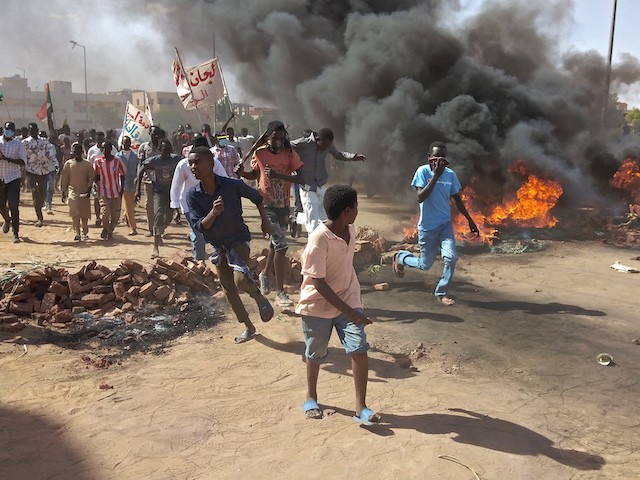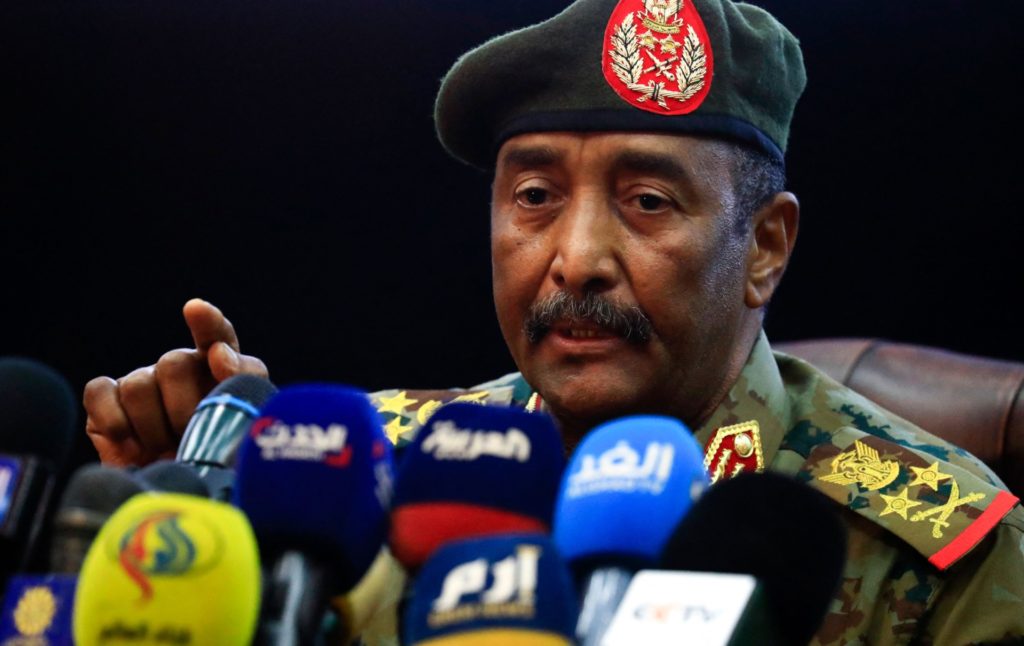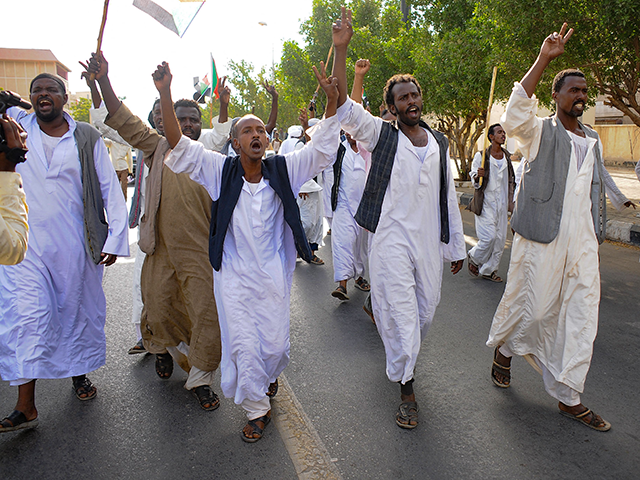The U.N. International Organization for Migration (IOM) estimated on Wednesday that the number of people displaced by the vicious factional war in Sudan has exceeded 3 million, with some 2.4 of them displaced internally and 730,000 crossing into other countries to seek refuge.
The IOM said most of the refugees fled from two locations in Sudan: Khartoum, the capital and scene of some of the heaviest fighting, and Darfur, which has a terrible history of ethnic violence.

Sudanese anti-coup protesters attend a gathering in the capital Khartoum’s twin city of Omdurman on October 30, 2021, to express their support for the country’s democratic transition which a military takeover and deadly crackdown derailed. (AFP via Getty Images)
The primary conflict in Sudan is a duel between two leaders of the ruling military junta, army commander Gen. Abdel Fattah al-Burhan and paramilitary leader Mohamed Hamdan Daglo. Burhan and Daglo were partners in the coup that overthrew the civilian government in 2021, but their growing enmity erupted into a military conflict in April 2023.
The war is largely a battle of attrition, with each side trying to kill as many people as possible, and neither is very scrupulous about collateral damage. The U.N. human rights office believes hundreds, and possibly thousands, of civilians have been killed. The Sudanese health ministry says there have been over 3,000 casualties in total.

Sudan’s top army general Abdel Fattah al-Burhan holds a press conference at the General Command of the Armed Forces in Khartoum on October 26, 2021. (ASHRAF SHAZLY/AFP via Getty Images)
U.N. Secretary-General Antonio Guterres warned last week that Sudan is on the brink of a “full-scale civil war” that might destabilize the entire region.
“There is an utter disregard for humanitarian and human rights law that is dangerous and disturbing,” Guterres said, citing an airstrike on Saturday that killed at least 22 people in the city of Omdurman near Khartoum as an example.
The U.N. said that in Darfur, the RSF has joined forces with Arab militias to slaughter non-Arabs, wiping out entire villages and forcing the residents to flee across the border into Chad. Survivors said women and girls in Darfur have been raped. Darfur’s governor warned last month that another genocide in Darfur could be imminent.

People cheer a senior general loyal to army chief Abdel Fattah al-Burhan in the Red Sea city of Port Sudan, on April 20, 2023. (-/AFP via Getty Images)
U.N. special envoy Volker Perthes said on Thursday his office has heard reports of “murder, rape, and looting,” crimes for which all sides should be held accountable – a job he suggested might be carried out by war crimes tribunals at the International Criminal Court (ICC), although he did not outright call for prosecutions.
“The ICC of course is watching,” Perthes said. “It’s not up to me to ask the ICC to take action, but I think they are on it.”
Perthes said that absent such intervention, the war “will not end within a week or two weeks, or shortly in any respect,” even though he felt the suffering Sudanese people would like to be rid of both Burhan and Daglo.
Perthes was ordered to leave Sudan by Burhan on June 9, leaving a deputy behind to run the U.S. mission in Port Sudan while he relocated his office to Nairobi, Kenya. He said the situation has escalated into a “humanitarian catastrophe” – sadly not the first one for Sudan – and could spiral into a civil war or regional conflict.
The Sudan conflict has thus far proven impervious to efforts by regional leaders to negotiate peace. Egypt and Ethiopia hosted summits this week to bring Sudan’s neighbors together in search of a way to end the conflict, and while several regional leaders have condemned the conflict, none seems eager to take the lead negotiating position – or lead a multinational intervention force to subdue the combatants.
The BBC noted that no single African leader has been accepted as an impartial referee by both Burhan and Daglo, and Daglo seems especially uninterested in talking about a cease-fire now that his forces are making gains in Khartoum and Darfur.


